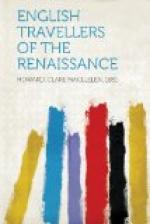* * * * *
CHAPTER V
THE INFLUENCE OF THE FRENCH ACADEMIES
The admonitions of their elders did not keep young men from going to Italy, but as the seventeenth century advanced the conditions they found there made that country less attractive than France. The fact that the average Englishman was a Protestant divided him from his compeers in Italy and damped social intercourse. He was received courteously and formally by the Italian princes, perhaps, for the sake of his political uncle or cousin in England, but inner distrust and suspicion blighted any real friendship. Unless the Englishman was one of those who had a secret, half-acknowledged allegiance to Romanism, there could not, in the age of the Puritans, be much comfortable affection between him and the Italians. The beautiful youth, John Milton, as the author of excellent Latin verse, was welcomed into the literary life of Florence, to be sure, and there were other unusual cases, but the typical traveller of Stuart times was the young gentleman who was sent to France to learn the graces, with a view to making his fortune at Court, even as his widowed mother sent George Villiers, afterwards Duke of Buckingham. The Englishmen who travelled for “the complete polishing of their parts” continued to visit Italy, to satisfy their curiosity, but it was rather in the mood of the sight-seer. Only malcontents, at odds with their native land, like Bothwell, or the Earl of Arundel, or Leicester’s disinherited son, made prolonged residence in Italy. Aspiring youth, seeking a social education, for the most part hurried to France.
For it was not only a sense of being surrounded by enemies which during the seventeenth century somewhat weakened the Englishman’s allegiance to Italy, but the increasing attractiveness of another country. By 1616 it was said of France that “Unto no other countrie, so much as unto this, doth swarme and flow yearly from all Christian nations, such a multitude, and concourse of young Gentlemen, Marchants, and other sorts of men: some, drawen from their Parentes bosoms by desire of learning; some, rare Science, or new conceites; some by pleasure; and others allured by lucre and gain.... But among all other Nations, there cometh not such a great multitude to Fraunce from any Country, as doth yearely from this Isle (England), both of Gentlemen, Students, Marchants, and others."[205]




